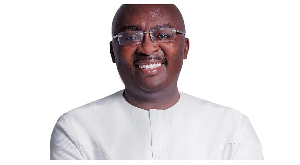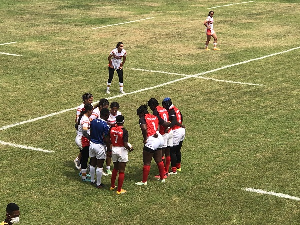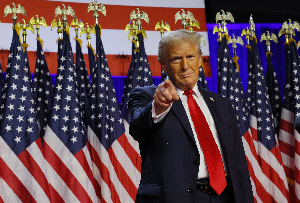The multiplicity and magnitude of the problems currently facing Ghanaians in the areas of the economy, water supply, energy supply, health and education has prompted me to write this article with this curious heading.
Our economy, from recent data, is suffering from the compounding effects of currency depreciation, under performing non-oil sectors, burgeoning public sector debt and the largest budget deficit (12.1%) since the 4th Republic began in 1993. We have arrived at this juncture from an expected 4.8% deficit for FY 2012, which was ushered in by Dr. Kwabena Dufuor with the following optimistic words, among others: “Madam Speaker, we promised Ghanaians a Better Ghana and we have significantly delivered on this promise: ….We promised to move the economy from fragility to robustness, yes, we have! We promised to significantly expand the economy, yes we have! We promised to arrest inflation, yes we have! We promised to arrest the rapid depreciation of the Cedi, yes we have!....” Yet what is the reality? Actually expenditure on capital investments decreased during the year; our currency lost nearly a fifth of its value against the dollar; and we ran a huge budget deficit on the back of astronomically increased recurrent expenditure (comprising mainly of financing costs for the huge loans we have taken at very punitive interest rates and increased public sector wage bill).
The water supply problems affecting Accra and its suburbs are largely due to lack of planning. It is shameful to think that we sat down as a nation, carried out no routine maintenance over the years, to arrive at a situation where filter beds are no longer serviceable leading to an interruption in supply whilst the deterioration is repaired. As if this suffering is not enough, the news is not good on the energy supply front either. Erratic power supply has become part of everyday life. How can an economy grow when power supply is not reliable? Those working at the delivery end admit that they lack sufficient generation capacity. Yet what do we hear from our leaders? It is as if they live in another country. This is the time they are promising energy for all by 2016 by connecting all communities to the national grid and are even promising to be a net energy exporter to neighbouring countries. Can we please be serious for once?
If Ghanaians have thought of substituting the lack of energy from the national grid with their own ‘generation capacity’ by using petroleum products, that option has also been severely curtailed with the ‘multiple inflation rate’ increases in prices of petroleum products. The increases may be justified but the handling of discussions leading to them was poor and of course this is due to the politics that have attended such increases. Are we saying that it is beyond the wit of the Ghanaian politician to devise a means of cushioning the poor against such increases and if not, should such measures not have been comprehensively announced at the same time as the increases?
Energy and water supply aside, Ghanaians are also facing issues in the health sector too. From all indications, the National Health Insurance Scheme is not healthy. We have all read about the problems facing policy holders in the Ashanti region and the recently announced plight of the Cape Coast Central Hospital. Doctors have recently embarked on strike action and Pharmacists were threatening similar action. Some are blaming the Single Spine Salary Structure but should that be an excuse? When it suited the government and its supporters, they claimed credit for having implemented it; and when it didn’t, they blamed their predecessor government. The aim of the SSSS was to remove salary anomalies but the NDC and its numerous hordes of communicators sold it as an across the board salary increase and the economy is reaping the negative impact of this approach.
The ticking time bomb that will next confront Ghana is in education, specifically relating to the two batches of students who will complete SHS this year. Already the ‘Daily Graphic’ has sounded out the warning on the problems that will confront examination resources. The concerns have been dismissed by an official of the Ministry of Education but don’t be surprised if the students do experience them during the exams. Lack of examination resources probably is the least of the problems. The real concern of parents is the availability or lack of university places, once the students have passed the examination. It does not appear that anybody in authority is even planning towards the chaos that will ensue, which will reverberate throughout the next few years. But of course this is Ghana.
So in the face of all these problems, what is our President doing? He has been meeting with chiefs who are paying homage on a daily basis; he has been promising a giant statue of Nkrumah to be placed at Circle; and he has been appointing people to positions of responsibility, few of whom are competent in the areas they have been assigned.
Come on! This is the 21st century, the 6th decade of Ghana ruling itself. Our leaders cannot continue to rule like kings who, traditionally, must not be publicly criticised. Our leaders must not only act to solve problems but must also be seen doing so. This is why the seeming lack of urgency in how the President is tackling the current situation is worrying. This is no time to be receiving visitors who are bringing nothing to the table to solve problems and neither is it the time to be announcing inconsequential projects. During a swearing-in ceremony on the 21st of February, the President expressed how uncomfortable he is with the current power situation. Mr. President, this is not a matter of comfort! This is a crisis situation and we want to see and feel your indignation. This is the one opportunity for you to demonstrate your ability to handle crisis and how quickly results accrue. In fact this is one occasion for you to show leadership!
In making this harsh criticism, I will illustrate with what happened elsewhere in crisis situations. In August of 2011, there was a riot in London which spread to the regions (especially Birmingham and Manchester). Everyone felt at the time that the police had been tardy. The Prime Minister (David Cameron) who was then on holidays in Italy, cut it short, to take charge of the situation. Within a day he had recalled parliament, held a meeting with all the Police Chief Constables in attendance to devise a strategy and also arranged for the courts to sit around the clock to deal with arrested rioters. With these measures the spread of the riot was contained within days. This is leadership in action. Another show of leadership is by President Obama after the December 15 2012 School shooting in Connecticut in the USA. In visiting the affected community, he promised a new look at gun control laws and appealed to Congress to work with him on this. Within about five weeks he has proposed a multi-package set of laws for which he is travelling round the country to drum up support. How long ago was the Melcom disaster and has any investigation report come out? Is there to be any legislative follow up to prevent such incidents in future? So far, there is no indication. But why is this so? Of course this is Ghana where no one in authority cares or chases issues through to resolution.
Thinking about the leadership crisis in our country, I have wondered whether our Constitution, apart from prescribing nationality and age, should have gone on further to prescribe the sort of competencies our Presidents, Ministers, MPs, Council of State members, DCEs and MCEs should have before putting themselves up for election or appointment. It seems we are only good at implementing the prescriptive parts of the Constitution, at times even reluctantly. But where the Constitution gives latitude for us to do due diligence, be creative, innovative and original in running the affairs of the nation, we are failing BIG TIME! This is why some are calling for a unitary national development agenda but who is to say implementation of such an agenda would even be entrusted to competent individuals?
God help Ghana!
Dr Yaw Ohemeng
Manchester, UK
Opinions of Friday, 22 February 2013
Columnist: Ohemeng, Yaw


















